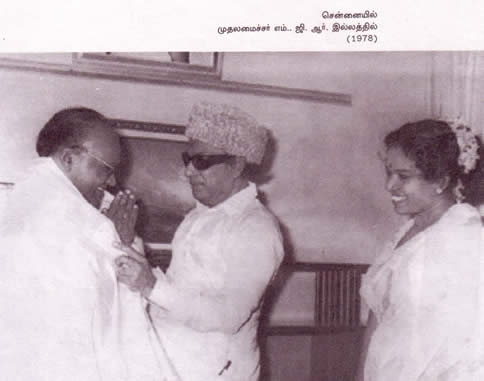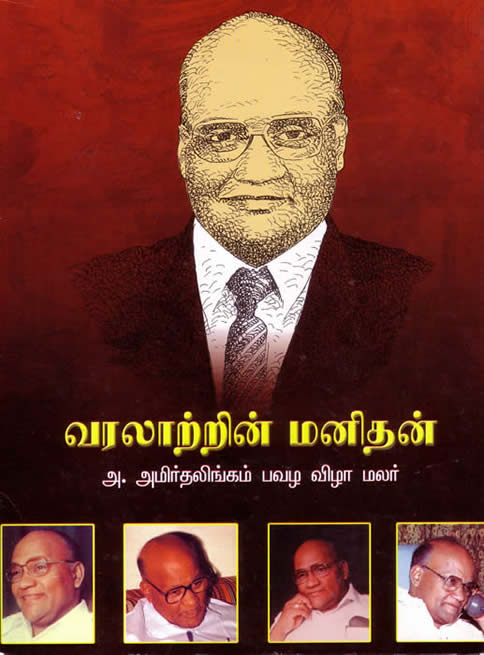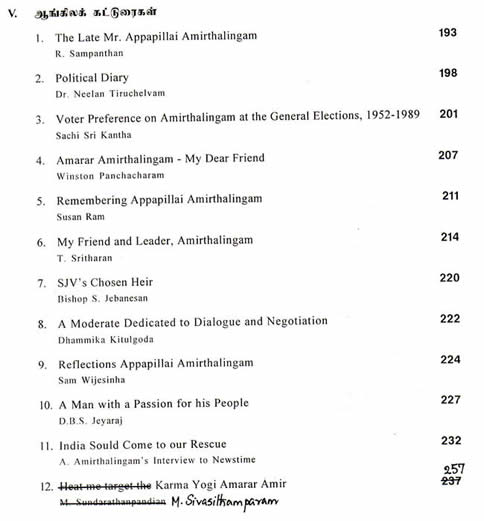Ilankai Tamil Sangam29th Year on the Web Association of Tamils of Sri Lanka in the USA |
|||
 Home Home Archives Archives |
On Mrs Mangayarkarasi AmirthalingamHer tongue and her dirge songby Satchi Sri Kantha, September 27, 2010
As Mrs. Mangayarkarasi Amirthalingam has been in the news lately, having returned to Colombo after 21 years, the media had provided publicity about her lamenting dirge song: “It they were fighting for the Tamils, why did they kill my husband? Why did they kill so many moderate politicians?”. This provides me with an opportunity to review the careers of Mr and Mrs. Amirthalingam, and what a hostile reception they received in the past from the Sinhalese, when Appapillai Amirthalingam (1927-1989) was alive. In the last quarter of 20th century, Sri Lankan parliament turned into a house of ill repute, with less decorum and decency than before. More than one reason could be attributed to this. A few include,
I quote Reggie Michael, a senior journalist of those days: “Ask those who have watched parliament in sessions and they shake their heads in disbelief. The men whom they voted as their guardians, seen off-guard in parliament. When controversy swirls around during debate, they erupt like enraged school boys. They shout; they yell. They give no chance to the man – even worse, the woman – on his or her feet.” The one who was at the receiving end of heckling, shouting and interruptions very frequently in those years (from 1977 to 1983) was Appapillai Amirthalingam. To be fair, Amirthalingam took all this give and take in parliament, as part of the political game. Minister Cyril Mathew’s 1979 outburst on Mrs. Amirthalingam’s tongue On April 3, 1979, Minister Cyril Mathew (a confidant of the then President J.R. Jayewardene) was in an aggressive mood. His target was Mrs. Mangayarkarasi Amirthalingam, the wife of Amirthalingam, the then Leader of Opposition. Lest one forget recent history, especially Mrs. Amirthalingam and her kin, I provide below excerpts of Cyril Mathew’s speech on that day. Mr. Amirthalingam (with a couple of his TULF colleagues) was present in parliament on that day, as revealed by the interruptions to Minster Mathew’s anger against Mrs. Amirthalingam. “Cyril Mathew: …Sir, pardon me for what I say from now onwards, but if a woman enters the political fray, then she must be ready to give and take. She has not observed any rules in her attacks and I am not going to observe any rules other than the parliamentary rules. She has no protection in this House…what is she wanting? Deep down in her mind some trouble spot is there. What are her desires that she wants to express? Is she a maniac? Is she a megalomaniac or is she a nymphomaniac?...What is wrong with this woman? Can no one control her mouth? Has the husband got the potency to control her or not? Has he control over her tongue or any other organ? A. Amirthalingam: Mr. Speaker, is this decent language to be used in Parliament? (Interruption) M. Sivasithamparam: No sense of shame. If your wives are attacked like this, how would you feel about it? Mr. Speaker: I might say they are not happily worded, but I cannot say they are unparliamentary. V.N. Navaratnam: It shows the mental illness of the person who is speaking. A. Amirthalingam: A depravity of the mind is being shown by the Hon. Minister. C.P.J. Seneviratne: Wait we will show you something else. C. Mathew: May, I pray, advise them, if none of them can control her, if nothing else can control her, in the name of heaven I appeal to them, poke a living feathery cock-bird into her mouth so that the muzzled crowing of the cock bird will at least smother the vituperations that come out of her throat. That alone will stop her.” In the same speech, Minister Mathew continued the same aggressive mood against Mrs. Amirthalingam, as follows: C. Mathew: This foul-mouthed woman – from her mouth emanates shit, verbal shit and nothing else. M. Sivasithamparam: Sri Lanka’s parliamentary language! C. Mathew: What is unparliamentary there? A. Amirthalingam: To you nothing is unparliamentary - C. Mathew: Take back what you give. M. Sivasithamaparam: I hope ‘The Hindu’ editor will publish that also. Speaker: I leave it to hon. Members to choose their language.” Cyril Mathew’s choice words for Mrs. Amirthalingam in 1979 were tasteless and ugly. But, one should remember that, the Sinhalese media, journalists and public were entertained. I don’t remember any of the Sinhalese journalists rebuking the Minister for his exuberant use of verbal aggression in parliamentary floor. Now, will you jump to 2003 (14 years after the assassination of Mr. Amirthalingam)? One finds an editorial in the anti-Tamil daily The Island, hoisting the widow of Amirthalingam as a visionary, with a caption, “Listen to Mrs. Amirthalingam”. It clearly showed how fickle was the Sinhalese hypocrite opinion. (1) As long as, Tamils raise their voice for Tamil rights, they will be cursed by choice words. Mrs. Amirthalingam was the prominent Tamil women in 1970s to stand up for Tamil rights, as correctly observed by the Island editorialist in 2003. (2) As long as, Tamils (even the widow of Amirthalingam) switch sides and dance to the tune of Sinhalese interests, they will be anointed as visionaries. The above editorial had the following two sentences.
As one would note, by 2003, the baton for Tamil leadership had passed into LTTE’s hands, from TULF. This was partly because, TULF leadership of Amirthalingam left a vacuum in 1983, after they went into exile in Madras and surrendered their leadership rights to India’s mandarins.
Now, I have to be a bit harsh on Mrs. Amirthalingam, who in her younger days, after her marriage to Amirthalingam in 1954, was a graceful singer in the platforms of Federal Party (FP). It seems that, for the past 21 years, she has been singing only one dreadful dirge song (oppari). At whose insistence, we don’t know. But certainly, it is not to the benefit of Eelam Tamils. In Tamil culture, the dirge song was acceptable for a widow, for an year or two. But, to continue singing this dirge song repeatedly sickens the listeners. Of course, Mrs. Amirthalingam is a widow and had suffered. But there lives in Sri Lanka and diaspora tens of thousands of Tamil widows. Many became widows by LTTE’s deeds. But more than that, Government of Sri Lanka had contributed more to the Tamil widow count, not to mention the activities of Indian Peace Keeping Force (IPKF), during 1987-90, as well as the activities of Tamil quisling groups that were supported by the SL military. In this respect, I have regards for Dr. Parames Duraiappah, about whom I wrote recently in this website. She was made a widow in 1975 by LTTE. Privately, she may have grieved about her widowed status, but she didn’t sing the dreadful dirge song in public for years, as Mrs. Amirthalingam has been doing for the past 21 years. Maybe, being a doctor, Mrs. Duraiappah was able to heal her loss (however personal it was) quickly. A graceful and tactful singer knows when to stop her song and when to leave the stage. It seems Mrs. Amirthalingam hasn’t learnt this bit of professional decorum and tact. Self Introspection Needed Has Mrs. Amirthalingam reflected back on the political career of both her husband and herself? Even within the Federal Party and TULF, there have been many critics who were opposed to the arrogance of her husband. Many insiders placed the blame on the downfall of her husband indirectly to her actions. I met V.N. Navaratnam (ex-MP for Chavakachcheri) in 1985, who had functioned as the de-facto parliamentary group leader of TUF, during Oct. 1972 to Feb. 1975, when S.J.V. Chelvanayakam was out of parliament. Navaratnam told me in a discussion then that the decision making process in the TULF (after 1983, in Madras) was limited to a triumvirate (Amirthalingam, Sivasithamparam and R. Sambanthan). Others have hinted that, if Mrs. Amirthalingam was also included into this clique, they formed a TULF ‘Gang of Four’. Amirthalingam’s role in evicting those who had contributed their services to the Federal Party since its inception (such as V. Navaratnam, C. Rajadurai, M.K. Eelaventhan and journalist Kovai Mahesan) cannot be forgotten, for historical reasons. After the death of C. Vanniasingham (the then deputy leader of FP in 1959), Amirthalingam was positioning himself to reach the top and probably considered V.Navaratnam and C. Rajadurai as his potent rivals within the party. The other two (Eelaventhan and Mahesan) were mostly of nuisance value and could be cast off (irrespective of their services to promote him), after he reached the top. Age-wise, while Rajadurai was Amirthalingam’s contemporary (both being born in 1927), V. Navaratnam was senior to Amirthalingam by 17 years. I provide here the recollections of both Navaratnam and Rajadurai below, for record. V. Navaratnam on Amirthalingam One paragraph from Navaratnam’s 1991 memoirs provides his angle on what happened in 1968, when he opposed the Bill for the Registration of Persons resident in Ceylon, while the FP was in the coalition national government of the UNP. To quote,
Tiruchelvam mentioned was Neelan Tiruchelvam’s father, who then held the cabinet minister portfolio of Local Government. C. Rajadurai on Amirthalingam When Chelliah Rajadurai, the veteran FP activist who had been an MP representing the Batticaloa constituency for over 20 years (since 1956) resigned from the TULF to join the ruling UNP, he made a speech at the Parliament on March 23, 1979, accusing Amirthalingam for his wrong decisions following the death of S.J.V. Chelvanayakam, the founder of FP. I quote relevant segments:
I was requested to contribute an article to the Amirthalingam’s 75th Birth Anniversary Commemoration Issue in 2002. The chief organizer of the commemoration event, A. Baheerathan (Amirthalingam’s second son) was a student of mine for a little less than a year in 1979, at the University of Peradeniya. I have had a good rapport with him. For the benefit of those who haven’t read or received this particular issue, I reproduce here, what I contributed as the last segment of my short review on Amirthalingam’s political career, under the subtitle ‘Amirthalingam after death’.
I provide below the English translation of what Mrs. Amirthalingam contributed about her husband’s ideals:
Coda If one compares the thoughts of mine and Mrs. Amirthalingam in 2002, we can deduce a convergence. Now, one may ask, why Mrs. Amirthalingam did you get lost from the lessons thought by your dear husband, within the past eight years? References Mangayarkarasy Amirthalingam: Mannin Mainthan Makkal Thondan [Son of Soil, People’s Volunteer] in Varalarrin Manithan [Saga of Late Leader A. Amirthalingam], 75th Birth Anniverary Issue, Amirthalingam Memorial Foundation, Surrey, UK, 2002, pp. 263-268. Editorial: Listen to Mrs. Amirthalingam. Island, Colombo, Dec.4, 2003. Hansard (official record of Sri Lankan parliamentary debates): Speech of Minister Cyril Mathew. April 3, 1979, vol.4, no. 13, columns 1670-1675. Reggie Michael: Independent weekly, Colombo, Sept. 1, 1978. S. Mahalingasivam (Mali) and Dr. Panch.Ramalingam: Varalarrin Manithan [Saga of Late Leader A. Amirthalingam], 75th Birth Anniverary Issue, Amirthalingam Memorial Foundation, Surrey, UK, 2002, 288 pp. (bilingual compilation in Tamil and English). V. Navaratnam: The Fall and Rise of the Tamil Nation. Printed in Kaanthalakam, Madras, 1991, p. 268. Saroj Pathirana: Emotional homecoming after 21 years for Sri Lanka widow. BBC News, September 22, 2010 (www.bbc.co.uk/news/world-south-asia-11317430?) C. Rajadurai: Why did I resign? Pamphlet. (of a speech made in the parliament on March 23, 1979). Sachi Sri Kantha: Voter preference on Amirthalingam at the General Elections, 1952-1989. in Varalarrin Manithan [Saga of Late Leader A. Amirthalingam], 75th Birth Anniverary Issue, Amirthalingam Memorial Foundation, Surrey, UK, 2002, pp. 201-206.
| ||
 Dreadful Dirge Song
Dreadful Dirge Song What I wrote in 2002
What I wrote in 2002 What Mrs. Amirthalingam wrote in 2002?
What Mrs. Amirthalingam wrote in 2002?